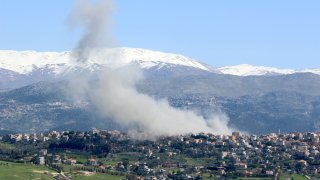Has Israel Crossed the Line in Lebanon?
The prospect of a sustained ground invasion in Lebanon presents a grim reality for the region.
In the past week, Israel’s invasion of Lebanon has significantly expanded, with the Israel Defense Forces (IDF) announcing that troops have captured a Hezbollah base in the border village of Maroun al-Ras. Drone footage has also revealed destruction in the nearby village of Yaroun. This escalation raises serious concerns about the growing humanitarian crisis and the potential for further violence in the region.
Anyone paying attention should be deeply concerned about Israel’s ground invasion of Lebanon. Though Israel describes its activity as “localized raids” and “very limited in scope and the area of operation,” the Lebanese government has said that a million people, a fifth of the population and a larger number than the displaced of the 2006 war, have fled their homes.
The human suffering is devastating, and the potential for continued tit-for-tat attacks between Israel and Iran could very well be the “October surprise” for the upcoming U.S. election. The risk of a broader conflict between Israel and Iran is not a distant or abstract threat; it’s a rapidly unfolding reality. With each passing day, the chances of escalation grow, pulling not only regional actors but also the United States deeper into the fray. A senior U.S. official has confirmed that the Pentagon plans to send thousands of additional troops to the Middle East in response to heightened tensions, underlining Washington’s ongoing commitment to Israel’s security despite its violations of International Humanitarian Law (IHL) over the past year.
Recent escalations, such as the killing of Hezbollah leader Hassan Nasrallah and the subsequent Iranian retaliation with over 180 missile strikes into Israel, show how quickly the situation could spiral into a larger conflagration. Iran’s leadership has already signaled a hardening stance. There is a real risk that Israel’s threats to make Iran “pay” will set the stage for even greater escalation.
The stakes are high, and the window for action is closing rapidly. Policymakers must recognize that the longer escalation continues unchecked, the greater the risk the United States is forced into an even more dangerous position in the Middle East.
It’s instructive to visit the lasting impact of the 2006 war, which, in only thirty-four days, left lasting scars on the Lebanese population and the wider region’s psyche and environment, fueling further animosity and trauma and contributing to the ongoing tensions that plague the regional political landscape. The conflict serves as a reminder of the cost of military actions in densely populated areas, where civilian casualties and destruction of infrastructure are inevitable. A new invasion could follow a similar trajectory, especially in Southern Lebanon and the densely populated suburbs of Beirut. Israel has already dropped U.S.-supplied 2,000-pound bombs directly on Beirut, following a playbook similar to its operations in Gaza.
While the Biden administration briefly paused shipments of these munitions in May, deliveries have since resumed.
Israel’s military doctrine, widely criticized for its disproportionate use of force, poses serious risks for the violation of IHL. Under the principle of distinction, belligerents must differentiate between combatants and civilians, a principle that Israel has disregarded throughout its war in Gaza and previous regional conflicts. Israel’s military has regularly violated the principles of proportionality and necessity, including during the 2006 war when civilian areas were heavily bombarded. Blockades and artillery fire used in tandem with ground operations, cutting off civilians from food, water, and medical supplies, may amount to collective punishment, a grave violation under the Fourth Geneva Convention.
Compounding the potential humanitarian crisis is Lebanon’s fragile healthcare system. The country is still reeling from recent nationwide explosions of pagers and walkie-talkies, which killed at least thirty-two and injured over 3,000 people. An Israeli ground invasion would exacerbate this crisis, leaving vulnerable populations without essential support.
Lebanon already hosts the world’s largest number of refugees per capita and per square kilometer in the world, with 1.5 million Syrian refugees alone. A renewed conflict risks adding significant strain to Lebanon’s resources, particularly for civilians in Southern Lebanon, whose homes, schools, and hospitals will be first in the line of fire.
The potential consequences also go far beyond humanitarian concerns. The country has been grappling with hyperinflation and political paralysis and has failed to elect a president in over a year. Hezbollah's newly acting leader, Naim Kassem, has already vowed to retaliate if Israel escalates, which risks entangling the region in a prolonged, bloody conflict that would very likely spread beyond Lebanon’s borders.
The United States plays a key role in Israel's military actions, especially through the provision of weapons and munitions. Senator Bernie Sanders (D-VT) recently announced his intent to block a $20 billion weapons sale to Israel, which includes F-15 fighter jets and tank cartridges. Sanders’ argument that U.S.-supplied weapons should not perpetuate violence against civilians is not only relevant to Gaza but also to Israel’s ground invasion in Lebanon. U.S. arms look set to fuel yet another devastating conflict in which civilian suffering is inevitable; one that the American people have little patience or appetite for.
The prospect of a sustained ground invasion in Lebanon presents a grim reality for the region. Beyond the immediate humanitarian fallout, the invasion risks further destabilizing Lebanon and igniting a broader conflict in the Middle East. Congress must act swiftly and decisively to prevent more escalation by halting the flow of arms that could enable greater violence. History has shown that in the absence of accountability, these cycles of violence are bound to repeat themselves.
Janet Abou-Elias is a co-founder of Women for Weapons Trade Transparency and a research fellow at the Center for International Policy.
Image: Ramiz Dallah / Shutterstock.

